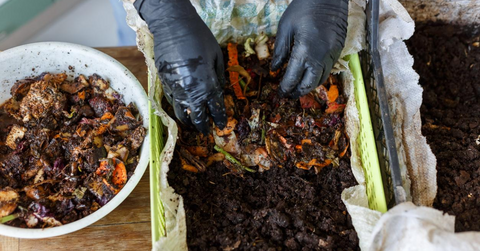Worm Farming 101: How (and Why) to Get Started
Aug. 27 2020, Updated 10:30 a.m. ET

So you’re familiar with composting and the many benefits it offers.
Whether you’ve educated yourself on the subject, dabbled in it here and there, or are a full-on pro post-quarantine life, we’re rooting for you!
If you’re ready to level up on your composting game — or just learn a little something you may not have heard of before — we’re here to talk about worm farming.
Yes, you read that right. Worm farming (or vermiculture) is a real thing, and it’s actually a really good thing for Mother Earth!
Worm farming is a very low-maintenance and eco-friendly way to limit food waste and re-invest in the planet.
Here’s everything you need to know to start your own worm farm.

Okay, but what is a worm farm?
This is a natural first question, and worm farming is exactly as the name implies. A worm farm is a contained compost space where live worms feed on household food scraps.
The benefit here is that they leave behind waste of their own, which makes for incredibly nutrient-dense fertilizer.
This worm-produced fertilizer is also known as vermicompost, as Modern Farmer shares. It’s the very goal of vermiculture, with countless well-known benefits.
Here’s why worms and composting go hand in hand.
To put it plainly, the answer to, “Why worms?” is “Because their poop is magic.” Let us explain.
As mentioned, vermicomposting produces some of the highest quality, all-natural garden fertilizer possible. It’s known to be intensely nourishing for potted plants and gardens alike — so much so, in fact, that it’s widely known as “black gold.”

“Worm farms use earthworms to break down organic matter such as food scraps to produce worm castings and the liquid ‘worm wee,’ properly termed worm casting leachate,” as Deep Green Permaculture describes it.
Don’t let the terminology trip you up. The “worm wee” these experts are referencing is also called worm casting, vermicast, or just plain old worm poop.
And it’s an organic form of fertilizer that earthworms produce.
Choosing the right worms is key to success.
There are different ways to get started with a worm farm, but first, you’ve got to work with the right worms!
As mentioned, earthworms store the magic that every worm farm needs. But they’re not the kind that come from your garden or backyard.
Red wigglers or redworms are the most popular choices for worm farms because they can eat about half of their weight in a single day and thrive in a compost environment, reports say.
They can easily be ordered online and shipped directly to you.

Ready to start your worm farm?
Great! The easiest approach is to purchase a pre-made farm online, but it’s a more expensive alternative to creating one of your own.
When building a worm farm of your own, choose a container that’s suitable for your available space. Here’s what you’ll need, according to the U.S. Environmental Protection Agency:
- Two rubber or plastic bins — one taller bin with a lid, and one shorter, bottom bin without a lid
- A drill to drill holes in the taller bin
- Scrap of screen (The EPA says window screens work fine provided there is no metal)
- Waterproof glue to keep screens in place
- Shredded, non-coated paper, moistened in water to create the right environment
- Worms, of course!
- Trowel or tool to move compost around in the bin
- Food scraps container to collect your household scraps (They can be fed directly by putting food scraps right in your worm farm, but feeding them once a week is preferable)

From here, drill small holes about two inches from the top of the taller bin on both sides, along with four 1/8-inch holes near the bottom corners.
Next, you’ll want to cover each hole with vinyl screening, glue it in place, and let dry completely.
Then, place the tall bin inside the short bin (which should not have any holes).
Now you’re ready to add your paper, soil, and just enough water to dampen everything, adding the entire mixture into the tall bin. Fill the bin about three inches deep with this mixture.
Now it’s time to add those worms! The EPA recommends letting them get used to their new environment for a day before feeding them your food scraps.

Create a feeding schedule for your new worm farm.
As mentioned, while it’s okay to toss your food scraps directly into your worm farm as you create them, it’s recommended that you hold onto them and feed your farm just once a week.
Before you feed your worms, throw in a healthy handful of the shredded paper. Then add your food scraps on top of the paper, and cover the paper and food scraps with dirt and additional, pre-moistened paper.
There’s a logic here! “Exposed food attracts fruit flies, but covered food scraps don’t. Add dirt and moist paper to the bin until the worms have made enough compost to use to cover the food scraps.”
From there, close up your bin, and let the worms work their magic.

And remember — there are ‘yes’ and ‘no’ foods for your worms.
Your worms won’t be particularly picky, but we tracked down some general guidelines to keep in mind.
When feeding your farm family, a good rule of thumb is to say “yes” to things like non-citrus fruits, vegetables, egg shells, bread scraps, coffee grounds, used tea bags, and — wait for it — even vacuum cleaner dust!
It’s best to avoid things like citrus fruits, onions, garlic, meat, fish, poultry, eggs, dairy, and processed food.
Happy worm farming, and let us know how you make out!